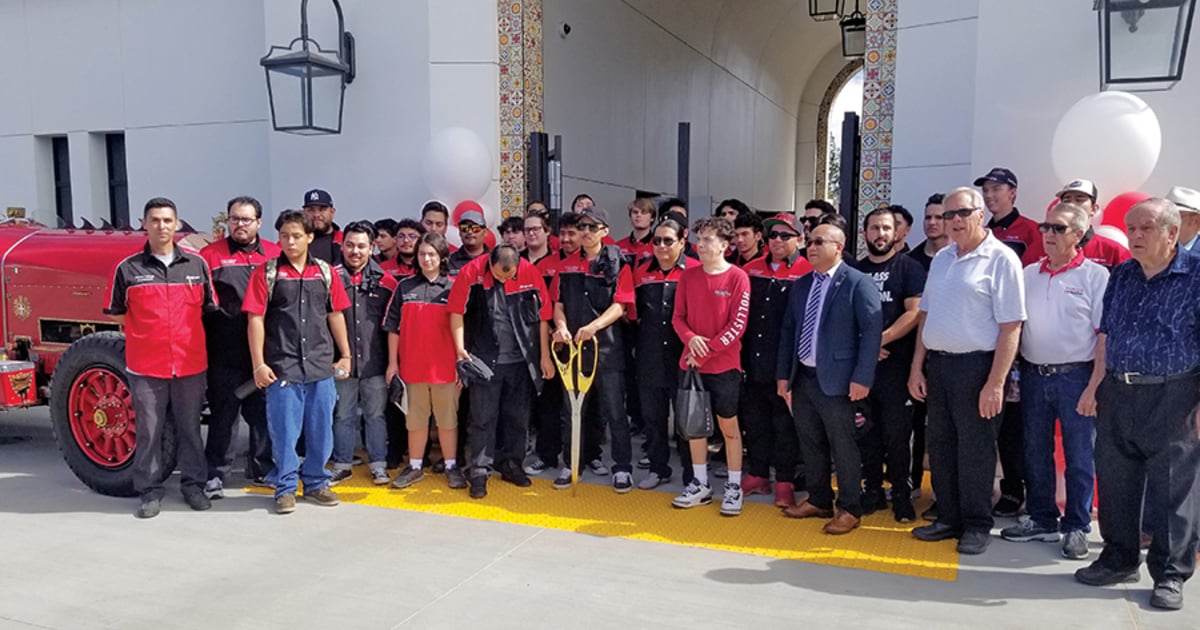
WOODLAND HILLS, Calif. — Pierce College inaugurated a $22.3 million Advanced Automotive Technology building in mid-October to expand its automotive service technology program. Community colleges such as Pierce are a vital source of service technicians for auto dealerships.
The job of automotive service technician is evolving, and funding is pouring into programs to meet the need for technicians who can work on electric and autonomous vehicles. But the job’s image is still stuck in its grease and grime past, and that needs to change to help attract more young people to the field.
“People don’t want their kids to be auto mechanics,” says Tom Fortune, associate professor of automotive service technology and a faculty advisor at Pierce. “They want them to be doctors and dentists and lawyers.”
The new 21,233-square-foot building includes bays specifically designed for teaching curriculum related to alternative fuel vehicles, including advanced diagnostics. It was paid for by a 2008 California bond measure that raised $3.5 billion to improve community college facilities to better prepare students for jobs.
It replaces two older buildings that will now house “legacy” technology, said Mon Khat, dean of career technical education. “It will increase our capacity to train our students on new technology,” he said.
Those students will need more than just a love of cars. Today’s vehicles are rolling electronic devices. The job of service technician is now “specialized labor,” says Alex Villalta, associate professor of automotive service technology and a graduate of the Pierce program.
“With this whole electrification and autonomous era, we found out the students need to have an affinity for technology and programming and computers,” he said. “The students are coming in with laptops instead of toolboxes.”
Villalta sold 19-year-old Miguel Nieto on studying to become a service tech during a high school field trip to Pierce. The high-tech nature of the job isn’t what most interests him, however. Nieto is studying to work on performance engines.
“Gas or electric, as long as it is fast, that is what makes me happy,” Nieto said.
Other students are at Pierce to update their knowledge and skills. Ivan Angelino, 41, worked in the auto repair business about 20 years ago, then left it to raise a family. Now he wants to further his career.
“You need computer programming knowledge” now, he said, adding “I want to make it into the corporate structure.”
Northridge Toyota in California hires Pierce graduates, said shop manager Edward Lujan, who is in charge of everything from recruiting service technicians to ensuring they pass all the certification exams needed to advance. He has been in the service industry for 35 years, all of them with Toyota and Lexus.
Lujan “fell in love” with his service technician job because “it was all about electronics,” he said. When he started in 1988, there were six computers in the Toyota and Lexus models he worked on. Now there are 50, he said. “If you are a computer guy, this is a great job,” Lujan said.
The need for service technicians with a new skill set is being driven by mandates such as California’s requirement that 100 percent of new car and light truck sales must be zero-emission vehicles by 2035. Other states, which together account for some 40 percent of new car sales, generally follow California’s lead in such mandates.
Meanwhile, the supply of automotive technicians from postsecondary programs in the U.S. dropped by nearly 12 percent in 2021, according to the TechForce Foundation’s 2022 Transportation Technician Supply & Demand Report.
Pierce received a $500,000 IDEAL ZEV Workforce Pilot grant from the California Energy Commission to develop a new zero-emission-vehicle curriculum, said Larry Rillera, a senior staffer in the commission’s clean transportation program.
He just finished visiting 52 high schools to turn students on to the idea of servicing zero-emission vehicles.
Students who are “into EVs are the cream of the crop,” he said. “They are interested in EV technology and design.”
Dealer associations also are funding technician training. The California New Car Dealers Association awarded $413,000 over the past five years to 334 California students for training.
“California is leading the way with innovation in the auto industry and with the adoption of electric vehicles and autonomous vehicles, which means that we also have to lead the way in training our future auto technician work force,” K.C. Heidler, president of Tom’s Truck Center and the California New Car Dealers Association Foundation chair, said in an email. The foundation disperses the grants.
The Greater Los Angeles New Car Dealers Association began supporting technician resource development in 2018. This year, it dispersed $120,000 in $10,000 and $20,000 increments to community colleges for tuition assistance, tool reimbursement and equipment enhancement. Pierce is among the colleges that received a grant this year. Bob Smith, executive director of the Greater Los Angeles New Car Dealers Association, declined to specify the amount it received.
Funding alone won’t attract more people to the service technician field, however, Smith said. That requires getting parents, career counselors and mentors to see it as a viable career.
“We need to change the image, but it is still tough,” he said. “A lot of dollars are being thrown at developing the next generation of auto techs, but there is still a lot to do.”